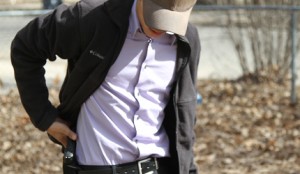
Starr headed to Austin in support of tuition grants
By Daniel C. Houston
Reporter
Baylor administrators will engage in “an orchestrated lobbying effort” to combat bills in the Texas Legislature that could require [PDF] Baylor to allow licensed students to bring concealed weapons onto campus.
The bill, filed by Republican Rep. David Simpson, would prohibit a public university or private or independent institution of higher education from adopting “any rule, regulation or other provision prohibiting license holders from carrying handguns on the campus of the institution,” according to the bill as originally filed in the Texas Legislature’s online database.
“I think this is an alarming situation when you have 14,000 students on a campus,” said Tommye Lou Davis, vice president for constituent engagement, who oversees Baylor’s department of governmental relations. “It makes no sense to me for students to be allowed even with a conceal-and-carry permit. It seems disturbing that that would be an option on campuses across the state.”
Davis hopes to convince legislators to include an opt-out clause exempting private institutions like Baylor from the bill’s provisions.
“We would first like an exemption for private institutions,” Davis said, “but if that does not happen, I think the wording in the bill is such that we can build a case for having control over the storage of the firearms.”
Baylor President Ken Starr will travel to Austin on Tuesday to try to convince legislators to scale back proposed cuts to the Tuition Equalization Grant (TEG) program, and will address other concerns that could include the concealed-carry legislation, according to Davis. Traveling with him will be Davis, Rochonda Farmer-Neal, director of governmental relations, and the Baylor Ambassadors, a student organization that lobbies on behalf of Baylor.
“Our goal over the next couple months is to have four or five trips down there to add back as much as we can, given that that much [TEG funding] has been proposed to be taken out,” said Chris Hayes, McKinney senior and president of Baylor Ambassadors.
“We understand there’s a good chance that we won’t be at the current level we’re at, but we’re hoping it won’t be as drastic a cut as they’ve proposed.”
A proposal released last week [PDF] by the Legislative Budget Board would cut $87.4 million in funding for the tuition equalization grants, a move that could affect up to 3,200 Baylor students who benefit from the program, according to Lori Fogleman, director of communications.
“We’re optimistic that we’re going to be able to minimize the damage,” Davis said, “that the cuts will not be as deep as in the original bill that was filed.”
Hayes said the Baylor Ambassadors are focusing on state grants in Tuesday’s lobbying efforts, but added that they could potentially address the concealed-carry legislation in the future.
“The TEG is definitely Baylor Ambassadors’ top priority,” Hayes said, “and has been for years.”
Allen Brittain, Garland senior and member of the Young Conservatives of Texas, said that the time has come for Baylor to have a serious conversation about concealed weapons policy.
Although he doesn’t think the policy ought to be imposed upon Baylor by state law, Brittain would like for licensed students to be able to bring weapons on campus due to his belief that it would make campus safer.
“There definitely should be an opt-out clause for Baylor because it is a private university and it has the right to make its own policies,” Brittain said.
“But, saying that, I do believe that as a school Baylor should consider this concealed carry policy and get the Student Senate and student leadership involved in making the decision.”
Despite the high priority being given to concealed carry and TEG funding, Davis said the administration will also focus on other possible cuts, such as those in nursing aid programs and the statewide library program.
“We have to be mindful of all the things that could impact our students,” Davis said. “We will be lobbying for anything that adversely affects our student body.”






